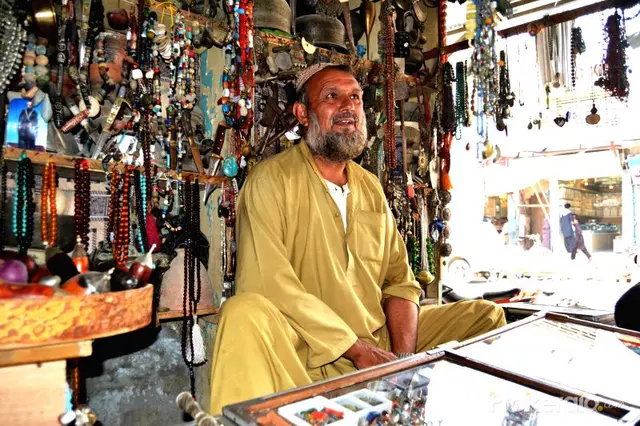The old store keeper was standing behind a glass case in his dusty shop in the southern Kandahar province and bargaining enthusiastically with a customer over the price of a rare and expensive artifact.
He explained to the customer that this particular relic was worth around 3,000 U.S. dollars and in fact worth several times more than that outside of Afghanistan.
"I have countless numbers of antiques, including teapots, old rifles, revolvers, daggers, swords and precious gems here in my store," the shopkeeper told his client."Some of these items are thousands of years old and the prices of these relics differ depending on their historical importance."
There are a dozens of antique shops in Kandahar city, but interestingly none of the shopkeepers have a license to sell their artifacts openly and legally.
"The government has yet to draft a law on selling relics nor issued licenses to antique sellers," Director of The Information and Culture Department in Kandahar province, Hazrat Wali Hotak, told Xinhua recently.
However, the official claimed that antique shopkeepers were selling their treasuries to each other and therefore the business was technically considered "inter-transaction trade" between local traders.
Some 500 historical artifacts, according to local officials, are on display in the Kandahar national museum, but the old-fashioned antique shops and their owners have been holding onto thousands of costly pieces that represent a variety of civilizations over centuries, ranging from Islamic historical artifacts, to those from the Bronze Age, Bactrian and the era of Alexandra the Great.
"We have objects that cost as much as 1 million U.S. dollars outside Afghanistan, but the price on the local black market is less than the actual value," shopkeeper Mohammad Ismeal told Xinhua.
Mohammad Dad, who said his antique business had been brisk recently, told Xinhua that each of the old shops has two doors, the front door and back door, but said that the real treasures were usually stored in the "back" of the shops, a reference to the place where the shopkeeper and the relic dealers can haggle privately on artifacts, away from prying eyes.
At the front top the stores, according to Dad, some pottery, teapots, rings, coins and old guns are put on display for the public, but the bone fide treasures are generally kept near the shops'backdoors.
He added that the majority of clients are foreigners, mostly from neighboring countries.
Like other institutions, Afghanistan's historical sites and cultural properties including the National Museum in Kabul were been badly damaged and looted during factional fighting in the 1990s.
In conflict-plagued Afghanistan where the government's grasp in the countryside is particularly weak, the illegal excavation of historical sites, including lapiz, is common practice.
The ongoing Taliban-led militancy and presence of hundreds of armed groups have made the job of stabilizing security difficult for the establishment and has impacted efforts to extend its control across the war-torn country.
Cultural heritages and countless historical sites in Afghanistan can bring millions of U.S. dollars to the national budget if the establishment were able to ensure security and provide services to attract tourists, local experts have said.
Taliban militants during its reign destroyed the giant Buddhas in central Bamyan province in 2001, using dynamite, and in doing so facilitated smugglers stealing valuable relics and selling them outside Afghanistan.
Even though hundreds of priceless artifacts have been looted from Afghanistan over the past decades, some have been recovered and repatriated to the national museum recently, although most of them remain lost, local archeologists have confirmed.
"Although we are against the selling of relics and have been supporting the government to protect our historical treasures, I am sure that the present government is unable to do this job," antique seller Mohammad Khan told Xinhua.
(APD)
 简体中文
简体中文











